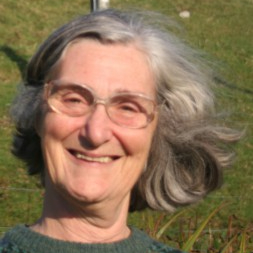Helen Steven facts for kids
Helen Steven (born October 19, 1942 – died April 12, 2016) was a Scottish Quaker who worked hard for peace. She was one of the people who started the Scottish Centre for Nonviolence. Helen was against nuclear submarine bases in Scotland. For her efforts, she received the Gandhi International Peace Award in 2004.
Contents
Helen Steven's Journey for Peace
Early Life and Education
Helen Steven went to Laurel Bank School and then the University of Glasgow. She worked as a history teacher for several years. In the early 1970s, she volunteered with the Peace Corps in Vietnam. Her experiences there made her deeply committed to pacifism. Pacifism means believing that all war and violence are wrong.
Building Peace Together
In the early 1970s, Helen became partners with Ellen Moxley. From 1979 to 1985, Helen worked for the Iona Community. This group focuses on Christian living and social justice.
In 1985, Helen and Ellen started Peace House near Dunblane. It was a place where people could learn about peace, fairness, and nonviolent ways to make change. Over twelve years, more than ten thousand people attended courses there. Helen and Ellen chose to live simply. They earned less than the amount of money that would require them to pay taxes. This was because they did not want their money to help fund British nuclear weapons.
A Centre for Nonviolence
Later, in 1999, Helen helped create the Scottish Centre for Nonviolence. This centre closed in 2007. During its time, Helen developed a special course on non-violence. It was part of a master's degree program and was approved by the Open University.
Standing Up for What's Right
Helen Steven was very brave in her fight for peace. In 1984, she took part in a peaceful protest at the Faslane nuclear base. She was arrested for this. In her defense, Helen explained her actions. She said that if she believed the base was morally wrong, like the gas chambers of Auschwitz, then staying silent would mean she agreed with it. She refused to pay the fine she was given and was sent to prison.
Helen believed that every act of resistance, no matter how small, was important. In a book from 2000, she shared this idea. She gave the example of how people opposed the Augusto Pinochet government in Chile. After 20 years of concerts, letters, and protests, the government finally changed.
Later Years and Recognition
In 2002, Helen and Ellen Moxley moved to Raffin in Assynt, northern Scotland. In 2004, they both received the Gandhi International Peace Award. This award recognized their peaceful work against weapons of mass destruction.
In 2005, Helen gave an important speech to British Quakers. It was called No Extraordinary Power: Prayer, Stillness and Activism. Helen Steven passed away in 2016. Her partner, Ellen Moxley, survived her.
See also
- List of peace activists


